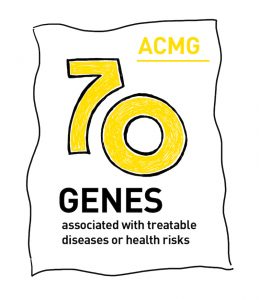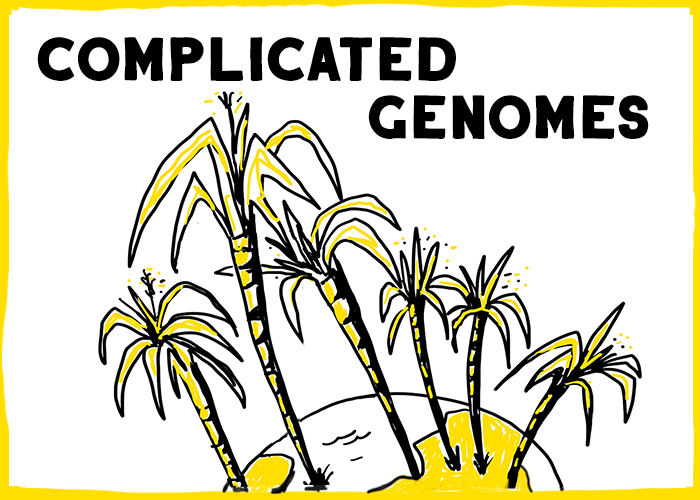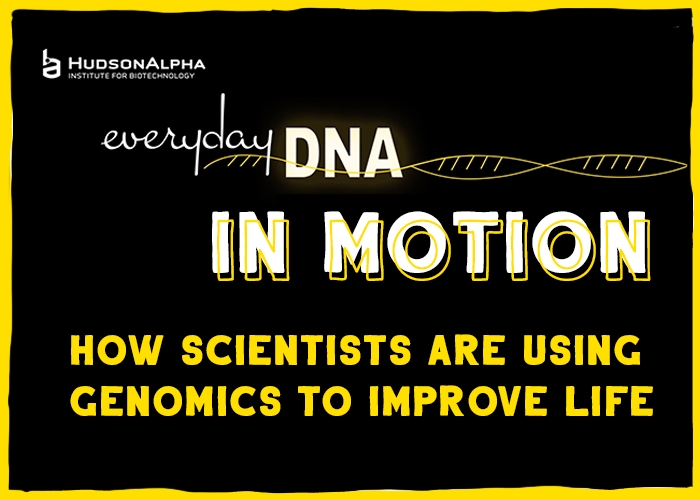An Everyday DNA blog article
Written by: Sarah Sharman, PhD
Illustrated by: Cathleen Shaw
Picture this: you’re driving home in rush hour traffic, surrounded by countless other vehicles trying to reach their destination. As you navigate through traffic, you’re acutely aware of the potential risks around you – the car in front of you suddenly braking or a driver merging without signaling. We all encounter risks like these daily, and we’ve learned to mitigate them through defensive driving techniques.
But what about the risks in our lives we can’t see? Deep within our genetic code, there’s a complex roadmap of potential health risks waiting to be uncovered. Understanding your genetic risk is like practicing defensive driving. Let’s learn more about genetic risk, its impact on our lives, and how understanding it can empower us to make informed decisions about our health.

What is genetic risk?
DNA, or Deoxyribonucleic Acid, is the fundamental molecule of life, serving as the genetic blueprint for all living organisms on Earth. DNA is a remarkable molecule that plays a central role in the inheritance of traits and the diversity of life as genetic instructions are passed from one generation to the next. About 99 percent of every person’s genome is identical to every other human. The one percent that is unique contains millions of variants, most of which have little effect on our health. However, scientists have discovered hundreds of DNA variants that cause or increase a person’s risk of developing disease.
The cause of many diseases is complex, influenced by changes in many genes in combination with lifestyle and environmental factors. However, thousands of diseases called Mendelian diseases are caused by changes in one gene that is enough to cause the disease on its own.
 Genetic risk is the likelihood or probability that an individual will develop a particular disease or health condition based on their genetic makeup. It is determined by the presence or absence of specific genetic variants associated with these conditions. Some genetic variants increase the risk of a disease, while others may provide protection.
Genetic risk is the likelihood or probability that an individual will develop a particular disease or health condition based on their genetic makeup. It is determined by the presence or absence of specific genetic variants associated with these conditions. Some genetic variants increase the risk of a disease, while others may provide protection.
Genetic testing is the method used to analyze an individual’s DNA to identify relevant DNA variants and estimate their predisposition to certain health issues. For genetic testing, a sample of DNA is collected, often through a blood or saliva sample. The DNA is analyzed in a laboratory using advanced technology to detect variations in the genetic code. Most genetic testing focuses on specific genes or gene regions known to be linked to particular diseases. By comparing an individual’s DNA with a reference sequence, the test can identify variants that may increase the likelihood of developing a particular condition.
Having a risk variant does not mean you will definitely develop a health condition, it just means you have a higher-than-average risk of developing the condition. Similarly, you could still develop the condition even if you don’t have a risk variant detected. It’s important to note that genetic risk is just one factor influencing health; lifestyle, environmental factors, and personal habits also play significant roles in disease development.
What diseases have established genetic risk factors?
Many diseases involve known or suspected genetic predispositions, including some of the most prevalent diseases in the U.S., like diabetes, cancer, heart disease, and some autoimmune diseases. With technological advancements, such as high-throughput DNA sequencing and genome-wide association studies, scientists continually uncover new genetic risk factors. As a result, our understanding of genetic risk becomes more nuanced and comprehensive, allowing for more precise risk assessments and personalized healthcare strategies.
 The American College of Medical Genetics and Genomics currently recognizes more than 70 genes associated with treatable diseases or health risks, including hereditary forms of cardiovascular disease, cancer risk, and several other rare genetic diseases. Several adult-onset diseases, like Alzheimer’s disease and Huntington’s disease, that do not currently have a treatment available also have known genetic variants. Here are a few specific examples of genetic risk factors:
The American College of Medical Genetics and Genomics currently recognizes more than 70 genes associated with treatable diseases or health risks, including hereditary forms of cardiovascular disease, cancer risk, and several other rare genetic diseases. Several adult-onset diseases, like Alzheimer’s disease and Huntington’s disease, that do not currently have a treatment available also have known genetic variants. Here are a few specific examples of genetic risk factors:
Among the most well-known genetic risk factors are disease-causing variants in the BRCA1 and BRCA2 genes. These variants significantly increase the risk of developing breast and ovarian cancers, particularly in women. Individuals with these variants have a much higher lifetime risk of these cancers compared to those without the variants. Women with a variant have a 45-85% chance of developing breast cancer by age 70 and up to a 46% chance of developing ovarian cancer by age 70. Genetic testing of BRCA1 and BRCA2 is often recommended for individuals with a family history of these cancers to help with early detection and prevention strategies.
Familial hypercholesterolemia (FH) is a genetic condition that leads to abnormally high cholesterol levels in the blood, significantly increasing the risk of heart disease at a young age. Several genetic mutations are linked to FH, including those affecting the LDLR, APOB, and PCSK9 genes. Genetic testing can identify individuals with FH, allowing for early intervention with cholesterol-lowering medications and lifestyle changes to reduce cardiovascular risk.
What are the benefits of understanding your genetic risk?
Knowing your genetic risk empowers you to take proactive steps toward managing your health effectively. It provides valuable insights into your susceptibility to specific diseases or conditions, allowing you to make informed decisions about lifestyle choices, medical screenings, and preventive measures. Armed with this knowledge, you can tailor your healthcare and lifestyle strategies to address your unique genetic profile, potentially reducing the risk of disease development or catching it at an earlier, more treatable stage.
Understanding your genetic risk can be particularly beneficial in cases where family history is unclear or when certain conditions have a genetic component that isn’t immediately evident. Ultimately, knowing your genetic risk is a powerful tool that can help you prioritize your well-being and work collaboratively with healthcare professionals to optimize your health outcomes.
Let’s look at a hypothetical example of someone undergoing genetic risk testing and the potential proactive steps they took based on their results.
Ellen is a 45-year-old woman with a family history of breast cancer. She decided to explore her genetic risk after learning that several of her relatives had been diagnosed with breast cancer at a relatively young age. Concerned about her own health, she opted to undergo genetic testing for BRCA1 and BRCA2 variants.
Ellen’s genetic test revealed that she carried a BRCA2 variant associated with a substantially higher risk of developing both breast and ovarian cancer. Armed with this knowledge, Ellen took proactive steps to mitigate her risk. She discussed her genetic test results with a healthcare provider specializing in cancer genetics. Together, they developed a personalized surveillance plan, including more frequent breast and ovarian screenings, mammograms, and MRIs to detect abnormalities at an earlier, more treatable stage.
Ellen embraced a healthier lifestyle by adopting a well-balanced diet, regular exercise routine, and stress-reduction techniques. She also limited alcohol consumption and avoided smoking, all of which can lower cancer risks. Ellen’s proactive approach to managing her genetic risk not only empowered her to make informed decisions but also significantly improved her chances of avoiding cancer or detecting it at an early, treatable stage.
How can you find out your genetic risk?
If you are interested in undergoing genetic risk testing and understanding your risk for certain common diseases, start by talking with your physician. They can help you understand the tests most appropriate for you based on your health and family history. They can also refer you to a specialist who will help you throughout the genetic testing process.
At the HudsonAlpha Institute for Biotechnology, there are several options for people looking to explore their genetic makeup and predispositions for certain diseases. In 2015, HudsonAlpha started a genetic testing initiative called Information is Power that offers free and reduced-cost genetic testing to women and men throughout Alabama. The genetic test examines several dozen genes associated with increased risk for breast, ovarian, colon, and endometrial (uterine) cancers. Since 2015, more than 6,200 people have participated, and four percent have discovered a genetic change that increases the risk of developing cancer.
The Smith Family Clinic for Genomic Medicine, LLC., is a stand-alone medical office residing on the HudsonAlpha campus that is devoted to the practice of genomic medicine. They offer general health risk screening, among other genetic tests. After undergoing general health risk screening, the results are analyzed by SFC’s board-certified genetic counselors, who interpret the results in the context of your medical history, family history, and other relevant factors. Depending on your results, they will recommend lifestyle changes or preventative screening measures.




